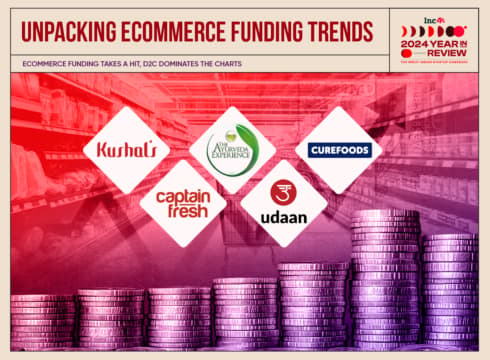Despite the shrink in the overall funding quantum, ecommerce emerged as the leading sector in terms of the number of deals bagged
Ecommerce startups lapped up 203 deals during the year compared to enterprise tech and fintech sectors, which had to make do with 167 and 162 deals, respectively, during the year
Ecommerce also emerged as one of the most funded sectors at the seed stage. Startups in the space raised $127 Mn during the year
Inc42 Daily Brief
Stay Ahead With Daily News & Analysis on India’s Tech & Startup Economy
Over the past decade, the Indian ecommerce sector has experienced remarkable growth on the back of ever-increasing internet penetration, adoption of digital payments, changing consumer behaviour, growing smartphone usage, and the expansion of digital infrastructure.
Given the current scheme of things, the Indian ecommerce market is expected to breach the $400 Bn mark by 2030, and a brigade of more than 500 Mn online shoppers is expected to drive this growth.
Despite the promising outlook, Inc42’s Indian Tech Startup Funding Report 2024 has revealed that the sector had to endure a 42% year-on-year (YoY) decline in funding in the just-concluded year. Notably, ecommerce startups raised a total of $1.5 Bn, down from the $2.6 Bn secured in 2023.
Interestingly, despite the shrink in the overall funding quantum, ecommerce emerged as the leading sector in terms of the number of deals bagged. For context, ecommerce startups lapped up 203 deals during the year compared to enterprise tech and fintech sectors, which had to make do with 167 and 162 deals, respectively, during the year. The Indian ecommerce sector netted 191 in 2023.
Ecommerce also emerged as one of the most funded sectors at the seed stage. Startups in the space raised $127 Mn during the year. This sum accounted for 14.2% of the total $893 Mn raised by early-stage ventures in the entirety of 2024.
Late-stage ecommerce startups secured $7 Bn in funding. Some of the biggest ecommerce deals of the year included Kushal’s, Captain Fresh, The Ayurveda Experience, and Curefoods. In the first half of 2024, Kushal’s raised $34 Mn, The Ayurveda Experience secured $27 Mn, Curefoods raised $25 Mn and Captain Fresh raised $20 Mn.
Now, let’s take a look at some of the key ecommerce funding trends observed in 2024:
- Overall, ecommerce startups raised $1.5 Bn+ in 2024, registering a 42% year-over-year decline in funding.
- Despite the decline in total funding, the deal count witnessed a 6% minor uptick in 2024.
- The median ticket size for ecommerce startup investments in 2024 was $1.8 Mn, down 10% from $2 Mn in 2023.
- Mega deal count decreased from 4 in 2023 to 3 in 2024.
- D2C startups secured $840 Mn, accounting for 54.9% of total ecommerce funding.
- B2C ecommerce startups raised $492 Mn, while B2B ecommerce raised $127 Mn out of the total funding.
- M&A activity in the space dropped significantly from 25 deals in 2023 to 6 deals in 2024.
- Ecommerce and fintech sectors emerged as the most funded for women-led startups in 2024.
D2C Shone The Brightest In The Ecommerce Realm
India’s D2C market has experienced exponential growth in the last few years and is expected to reach $100 Bn by 2025. Several factors have fuelled the rise of D2C brands.
With over 190 Mn digital shoppers, India is the world’s third-largest online shopping market, providing a prime opportunity for D2C brands to tap into the growing demand for innovation and the shift away from traditional players. The fashion and clothing sector holds the highest growth potential, expected to reach $43.2 Bn by 2025.
Emerging D2C brands like Mamaearth, CaratLane, Minimalist, Hyphen, and Nua have achieved remarkable success, reaching the INR 100 Cr revenue mark in a short span.
Interestingly, due to its potential, D2C remained the most funded subsector of ecommerce in 2024, accounting for the highest share of deals. This reflects strong investor interest in brands that sell directly to consumers, bypassing traditional retail channels.
“I remain very bullish on the D2C sector and anticipate significant action across multiple categories, including home, appliances, beauty, food, and wellness. More D2C brands will emerge, disrupting legacy players. The sector will continue to attract funding across various stages and milestones. Quick commerce will continue to create new opportunities in 2025 and beyond,” said Anurag Kedia, founder of Pilgrim.
Of the total $1.5 Bn raised in ecommerce funding, D2C startups raised $840 Mn, which accounted for 54.9% of the total funding. These startups secured funding through 162 deals, making up 79% of the total deal count in the sector.
Overall, homegrown startups cumulatively netted more than $12 Bn in fresh funds during the year, up over 20% from the $10 Bn raised in 2023. The year saw as many as 993 deals materialise, about 11% more than 2023.
[Edited By Shishir Parasher]
Access Free Report{{#name}}{{name}}{{/name}}{{^name}}-{{/name}}
{{#description}}{{description}}...{{/description}}{{^description}}-{{/description}}
Note: We at Inc42 take our ethics very seriously. More information about it can be found here.


